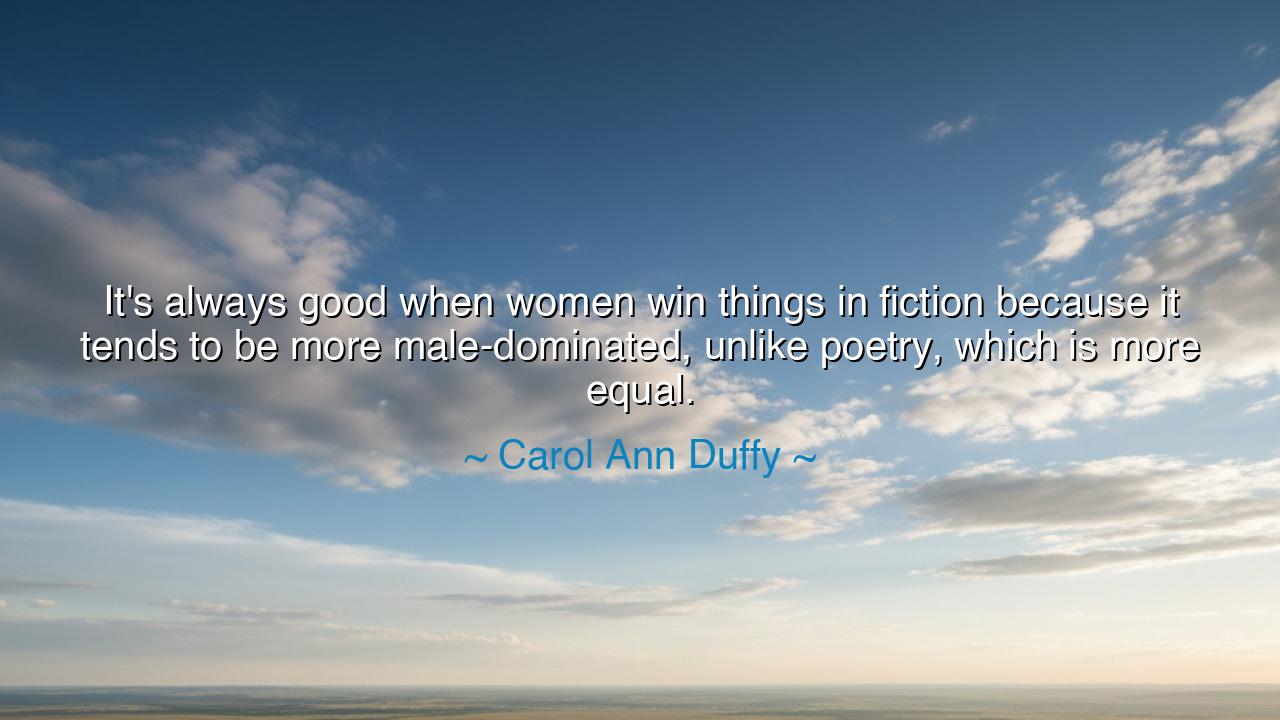
It's always good when women win things in fiction because it
It's always good when women win things in fiction because it tends to be more male-dominated, unlike poetry, which is more equal.






Hear, O children of the written word, the voice of Carol Ann Duffy, the first woman to hold the honored title of Poet Laureate in Britain, who spoke thus: “It’s always good when women win things in fiction because it tends to be more male-dominated, unlike poetry, which is more equal.” In these words lies both a celebration and a lament: a recognition that the kingdom of letters is not always balanced, and that for centuries, the voices of women have been muffled in some fields, yet have risen strongly in others.
For fiction, with its grand novels, its epic sagas, its towering reputations, has long been a realm where men claimed the greater share of glory. From Tolstoy to Dickens, from Hemingway to Faulkner, the banners of male-dominated triumph flew high. Women, though present, often struggled for recognition—Austen and the Brontës publishing anonymously or under disguises, Mary Shelley battling invisibility even as she gave the world Frankenstein. When a woman triumphed in this domain, it was not merely a personal victory but a symbolic one, a breaking of doors long shut.
Yet in poetry, the balance has been gentler, more welcoming. Perhaps it is because poetry springs from the intimate voice, the private heart, the song whispered to oneself before it is given to the world. From Sappho of Lesbos, whose lines still burn after millennia, to Elizabeth Barrett Browning, Emily Dickinson, Sylvia Plath, and Maya Angelou—women have always carved their rightful space in poetry. It has been a realm where the female voice could rise without needing disguise, where strength and vulnerability alike found resonance. Thus, as Duffy proclaims, poetry stands as a more equal stage.
Consider, dear listener, the story of Virginia Woolf, who spoke of the necessity of “a room of one’s own.” In her age, fiction was still seen as a male pursuit of grandeur, while women’s writings were often dismissed as trivial or domestic. Yet she urged women to seize pen and space alike, to write boldly, to refuse silence. Today, when women triumph in fiction—as did Toni Morrison, the first African-American woman to win the Nobel Prize in Literature—it is a continuation of that struggle, a signal that Woolf’s dream is being fulfilled.
But Duffy’s words are not merely about the battlefield of awards; they are about recognition itself. When a woman wins in fiction, it signals to other women that their voices belong, that their stories matter, that they may step into spaces long denied them. And when poetry stands as a more open field, it reminds us that art, at its truest, knows no gender, only the human soul crying out in language.
O seekers, take this lesson: where barriers exist, they must be broken—not only for one, but for all. When you celebrate the victories of women in fiction, you are not only honoring their individual genius but restoring balance to the larger story of humanity. And when you read the voices of women in poetry, you partake of an inheritance that is rich, diverse, and eternal.
Practical is this wisdom: read widely, read deeply. Seek out the voices that history once silenced, the authors who had to fight for recognition, the poets who whispered truths when no one would listen. Support the writers of today who, like Duffy, continue to carve out equal space in the realm of letters. And most of all, honor the truth that literature belongs to all—men and women alike, each voice contributing to the great chorus of human experience.
Thus, let Carol Ann Duffy’s words echo as both celebration and challenge. Celebrate that in poetry, equality has often flourished; strive so that in fiction, it may flourish as well. For when all voices are heard, when women and men alike win honor not by gender but by merit, then literature itself grows richer, more powerful, and more true to the fullness of the human spirit.






VHLam Van Hiep
I appreciate how Carol Ann Duffy points out that fiction is still largely male-dominated. However, I’m curious about the reasons behind poetry being more equal. Is poetry more egalitarian because it has been historically more accessible to women, or does it offer more freedom for diverse voices? I’d love to explore how societal perceptions of gender and literature shape which genres are more inclusive or exclusive.
VTThao Vy Tran
This quote brings up an important point about the challenges women face in male-dominated fields like fiction. It’s encouraging to hear that poetry seems to be more equal, but I wonder what factors contribute to that difference. Is it the inherent qualities of the genres, or is poetry just more welcoming to diverse voices? It would be interesting to delve deeper into how these art forms have evolved differently for women.
GDGold D.dragon
I find it interesting that Carol Ann Duffy highlights the gender imbalance in fiction while noting poetry as more equal. Could it be that poetry’s more personal and intimate nature allows women to express themselves more freely? Or do you think there’s something about the tradition of fiction that still limits women’s success? It would be interesting to explore why women seem to have a more prominent role in poetry than in fiction.
NHNguyen Hoang
This quote really makes me think about the gender dynamics in different art forms. Fiction has historically been dominated by male voices, so when women win, it feels like a rare victory. But poetry seems to be more balanced. Why do we see such a disparity between these two forms? Is it because poetry allows for more individual expression, or is it simply that the structure of poetry has been more accessible to women?